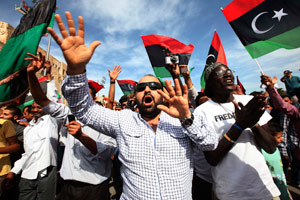VATCAN CITY–– The Vatican said the death of Libyan strongman Moammar Gadhafi marked the end of a “harsh and oppressive regime” that was based on power instead of human dignity.
 Libyans celebrate in Tripoli’s Martyrs Square after hearing news that Libya’s ousted leader Moammar Gadhafi was killed by fighters in Sirte, Libya, Oct. 20. Gadhafi’s death was hailed as the moment of liberation of the oil-producing country that the strongman ruled for 42 years. (CNS photo/Ismail Zitouni, Reuters)It expressed hope that the bloodshed would end in the North African country, and that the new Libyan government would open a rebuilding phase based on “a spirit of inclusion” and social justice.
Libyans celebrate in Tripoli’s Martyrs Square after hearing news that Libya’s ousted leader Moammar Gadhafi was killed by fighters in Sirte, Libya, Oct. 20. Gadhafi’s death was hailed as the moment of liberation of the oil-producing country that the strongman ruled for 42 years. (CNS photo/Ismail Zitouni, Reuters)It expressed hope that the bloodshed would end in the North African country, and that the new Libyan government would open a rebuilding phase based on “a spirit of inclusion” and social justice.
The statement was issued by the Vatican press office late Oct. 20, several hours after Gadhafi was reported killed in his coastal hometown of Sirte, where he had been barricaded with loyalist troops. His death came after months of bloody civil strife and NATO airstrikes in support of Libyan rebels.
The Vatican said the Libyan conflict had been “too long and tragic” and should prompt reflection on the “cost of immense human suffering” that accompanies the collapse of systems not founded on respect for human rights.
It encouraged the new Libyan government to try to prevent further violence caused by a spirit of revenge and to begin a program of pacification. The international community, it said, should provide generous aid toward the reconstruction of the country.
For its part, the minority Catholic community in Libya will continue to offer “its witness and its unselfish service, especially in the areas of charity and health care,” it said. The Vatican said it would work in favor of the Libyan people in the international diplomatic arena.
The statement said the Vatican considers the transitional government as the legitimate representative of the Libyan people. The Vatican, it said, has already had various contacts with the new authorities in Libya, through the Libyan Embassy to the Vatican, at the United Nations and in Libya.
It said the apostolic nuncio to Libya, who resides in Malta, had gone to Libya for talks in early October with the provisional prime minister, Mahmoud Jibril, and other officials.
“In these diverse encounters, both sides underlined the importance of the diplomatic relations between the Holy See and Libya. The Holy See had the opportunity to renew its support for the Libyan people and its support for the transition,” the Vatican said.
The officials of Libya’s new government have expressed appreciation for the humanitarian appeals of Pope Benedict XVI and for the church’s service in Libya, in particular the work of 13 religious communities in hospitals or assistance centers.
